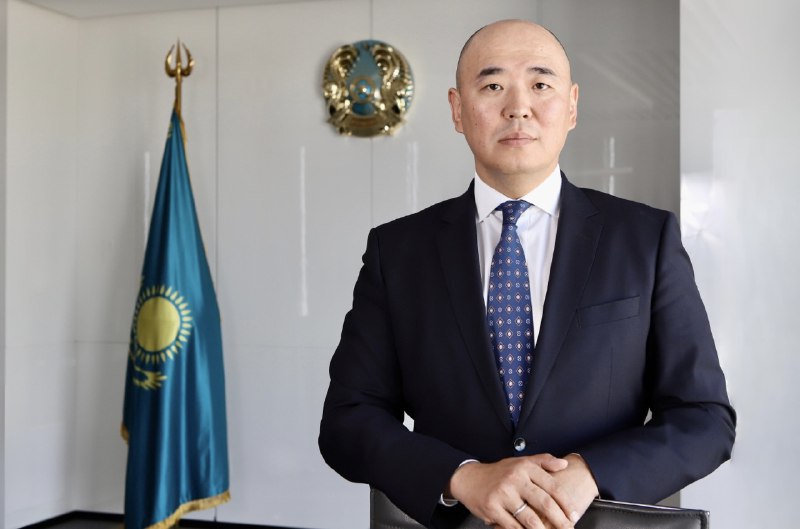ASTANA – Kazakh Minister of Industry and Construction Kanat Sharlapayev spoke about the promising potential of the European Union (EU)-Kazakhstan cooperation in critical minerals, Kazakhstan’s standpoint on the EU sanctions, and the recent sale of ArcelorMittal Temirtau in an interview with CNBC (formerly Consumer News and Business Channel) on Dec. 12.

Kazakh Minister of Industry and Construction Kanat Sharlapayev. Photo credit: gov.kz.
The EU remains Kazakhstan’s key trade and investment partner. The fast-paced development of economic cooperation and partnership in energy and transport doesn’t exclude contradictory patterns, indicating the need for deepening mutual trust between the sides.
Critical materials in EU-Kazakhstan cooperation
Critical materials represent a blueprint for a new chapter in the EU-Kazakhstan cooperation. Out of the 34 critical materials listed by the EU, Kazakhstan produces 18. These include bismuth, gallium, rare earth elements, silicon, vanadium, tungsten, tin, tantalum, niobium, magnesium, lithium, indium, graphite, and cobalt.
Kazakhstan is the world’s 10th largest copper producer. “Beyond that, beryllium, tantalum, niobium, and even titanium we already supply to the EU,” said Sharlapayev.
The minister underscored the ongoing work of production facilities available in Kazakhstan, which are already assisting some European companies in recycling materials and obtaining critical minerals.
When asked about Kazakhstan’s reliability in partnership with the EU given its shared borders with Russia and China, Sharlapayev noted that “Kazakhstan’s track record speaks for itself, as the country has already been a very reliable partner for European energy stability.”
“It is widely known that in uranium supplies, Kazakhstan has been reliable for many years to European partners, as well as in oil and conventional or carbon energy sources. I think this reliability fully extends to our capabilities in critical minerals as well,” he said.
Kazatomprom national atomic company indicates the country’s 14% share of all proven world uranium reserves, estimated at over 700,000 tons. In September, the company presented a strategy to increase uranium production volumes in 2025, returning to a 100% level relative to its subsoil use agreements for the first time since 2018 and adding 6,000 tons to global primary supply.
Kazakhstan’s standpoint on sanctions policy
Answering one of Western media’s most frequently asked questions on sanctions evasion, Sharlapayev reconfirmed Kazakhstan’s standpoint on sanctions policy by saying that the country’s territory “is not used and will not be used to circumvent sanctions.”
“I think Kazakhstan has been very clear with its policy in regard to sanctions,” he noted.
Two weeks ago, the second visit of International Special Envoy for the Implementation of EU Sanctions David O’Sullivan to Kazakhstan allowed to draw conclusions on positive dynamics in the EU-Kazakhstan cooperation in this regard.
“Historically, the majority of the European goods were reaching Kazakhstan through other countries, including Russia. It is not surprising that some of the European partners want access to markets in Central Asia, which are mostly accessible through Kazakhstan. That is part of the reason for our continuously stable trade flows with the EU,” he said.
Data from the Kazakh Foreign Ministry indicates that last year’s trade turnover between the EU and Kazakhstan reached a record high of $40 billion out of the $134 billion annual foreign trade.
Sharlapayev underlined that Kazakhstan has its economic interests serving for the good of its people. The country, he added, aimed to take its place along global supply chains, particularly by strengthening cooperation with European partners.
The sale of ArcelorMittal Temirtau
Speaking of implications following the fatal incident of the ArcelorMittal Temirtau mining company, the minister said that “unfortunately, the company’s safety record has been questionable over the years.”
“This was an amicable exit – ArcelorMittal sold its Kazakhstan’s unit. It has not been closed down. This is the only steel producer in Central Asia, capable of producing up to 4 million tons of metal every year,” he said.
Kazakhstan’s government is keen on improving the safety record and the environmental record of the enterprise, Sharlapayev noted.
Last week, the Kazakh government finalized its deal with ArcelorMittal on the purchase of shares worth $286 million by the Kazakh state investment fund, Qazaqstan Investment Corporation (QIC). ArcelorMittal donated 16 billion tenge ($34.9 million) to the Qazaqstan Halqyna charitable foundation.
“We encourage all investors in Kazakhstan to behave responsibly. Our global partners and investors in Kazakhstan have seen a tremendous foreign direct investment (FDI) inflow in the past year. We have achieved a $28 billion benchmark,” he said.
The investments were channeled to the mining and metallurgical complex, the manufacturing industry, trade, transport, and the financial sector.
Kazakhstan’s economic growth is primarily driven by a well-developed regulatory environment for investments and the steady improvement of appropriate support tools.

